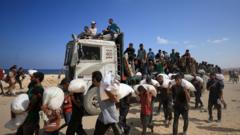Israel has opted not to renew the visa of Jonathan Whittall, a senior official overseeing humanitarian operations in Gaza. This decision comes against a backdrop of intensified military actions and rising civilian casualties in the region, triggering concerns about aid accessibility and the humanitarian crisis in Gaza.
Israel's Denial of Visa for UN Humanitarian Official Raises Concerns

Israel's Denial of Visa for UN Humanitarian Official Raises Concerns
Israel's refusal to renew the visa of a senior UN humanitarian official highlights rising tensions over aid access to Gaza amidst ongoing conflict.
Israel has taken steps to not extend the visa of Jonathan Whittall, who leads the Office for Coordination of Humanitarian Affairs (OCHA), a critical agency that facilitates humanitarian aid to Gaza and the West Bank. Gideon Saar, Israel's Foreign Minister, cited Whittall's alleged "biased and hostile conduct" against Israel as the reason for this decision. The refusal stems from Whittall's previous remarks regarding the casualties of Gazans, notably those killed while seeking aid.
The U.N. has expressed strong discontent about the decision, emphasizing that dialogue around the humanitarian situation is essential to its mission. The U.N. agency noted that attempts to curtail commentary from officials like Whittall hinder vital communication regarding the dire needs of civilians on the ground.
This visa denial coincides with reports of violence in Gaza, with Israeli troops recently engaged in clashes that resulted in numerous Palestinian casualties amidst the delivery of humanitarian aid. The ongoing conflict, which erupted following a devastating attack by Hamas on October 7, 2023, has led to severe humanitarian consequences, with the health ministry in Gaza reporting over 57,000 deaths.
The crisis has prompted widespread displacement among Gazans, with the World Food Program indicating that almost one-third of the population faces extreme food scarcity. Whittall's previous critiques of Israeli policies regarding humanitarian assistance underscore the contentious nature of operations within the region, as he referred to the current situation as "weaponized hunger" and a "death sentence" for civilians.
As tensions persist and humanitarian needs grow, the refusal to renew Whittall’s visa raises significant questions about the future of international humanitarian efforts in Gaza. With news of increasing naval blockade effects and disputes over the distribution of foreign aid, the complexities surrounding the Israeli-Palestinian conflict continue to pose challenges for civilian survival.
The U.N. has expressed strong discontent about the decision, emphasizing that dialogue around the humanitarian situation is essential to its mission. The U.N. agency noted that attempts to curtail commentary from officials like Whittall hinder vital communication regarding the dire needs of civilians on the ground.
This visa denial coincides with reports of violence in Gaza, with Israeli troops recently engaged in clashes that resulted in numerous Palestinian casualties amidst the delivery of humanitarian aid. The ongoing conflict, which erupted following a devastating attack by Hamas on October 7, 2023, has led to severe humanitarian consequences, with the health ministry in Gaza reporting over 57,000 deaths.
The crisis has prompted widespread displacement among Gazans, with the World Food Program indicating that almost one-third of the population faces extreme food scarcity. Whittall's previous critiques of Israeli policies regarding humanitarian assistance underscore the contentious nature of operations within the region, as he referred to the current situation as "weaponized hunger" and a "death sentence" for civilians.
As tensions persist and humanitarian needs grow, the refusal to renew Whittall’s visa raises significant questions about the future of international humanitarian efforts in Gaza. With news of increasing naval blockade effects and disputes over the distribution of foreign aid, the complexities surrounding the Israeli-Palestinian conflict continue to pose challenges for civilian survival.





















